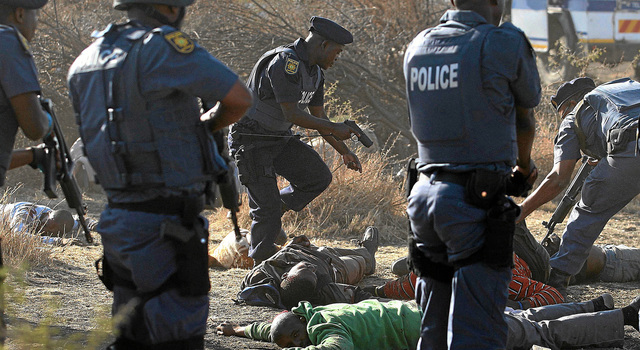The ANC survives South Africa’s ‘Arab Spring’

 Udo W Froese
Udo W Froese
Anglo American CEO, Mark Cutifani announced in a Business Day TV interview on April 11, 2014, in Johannesburg that they would “seek a buyer for our platinum operations in the North West Province and will move on to the opencast platinum mine, Mogalakwena in the Limpopo Province.”This also made front-page news of the daily business newspaper, Business Day, on April 14, 2014.
Cutifani explained that Anglo American prefers the more profitable opencast mining to “deep-level, labour-intensive and technically complex mines that make up Rustenburg.”
Sibanye Gold’s CEO, Neal Froneman, also followed this up announcing that his company was looking for platinum opportunities, a story that also made the front page of Business Day, April 15, 2014.
Said Froneman: “There is speculation in the market that Sibanye Gold was looking at Anglo American Platinum (Amplats) Rustenburg mines, that was not necessarily the case. I’d be very disappointed if by the end of this year we haven’t done a material platinum transaction.”
Is Sibanye Gold competing with Glencor?
There is one important observation from these developments.
There are attempts to destroy the National Union of Mineworkers (NUM) at the same time undermining the ANC support in the North West Province. Such strategic forward planning seems to be one of the efforts to unsettle the platinum mining and export sector.
Meanwhile, there is no end in sight to the platinum miners’ strike led by the Association of Mineworkers and Construction Union (AMCU) in the platinum and gold mining sectors.
The ANC-led government failed so far to achieve success in its mediation efforts. In the process, platinum mine owners claim to have incurred losses to the amount of R10 billion (US$1 billion), as documented in a Quantec and IDC research.
The Congress of South African Trade Unions (COSATU) cautioned AMCU against reckless behaviour, keeping its members out of programmes aimed at winning the labour dispute.
Through its absence from key talks with the mine owners, AMCU keeps the strike going.
The most senior members of the Royal Bafokeng expressed their concern about AMCU leader, Joseph Matunjwa, withholding crucial information from its members since January this year (2014).
It has emerged that certain powerful players particularly in the platinum and gold mining industry back Matunjwa.
But, would that not eventually lead to the exposure of Matunjwa and the backers of AMCU? It seems that AMCU’s shelve-life will soon come to an end, as many members have become disgruntled with its leadership.
On the other hand, the mineworkers and their families are steadily losing their homes, cars and other belongings as poverty sets in.
The Royal Bafokeng Administration realises “a legitimate sense of fear over the loss of revenue among its people”.
Since January this year in 2014, an increase in violence among the mineworkers across the mining sector has been recorded and this is reflected in miningweekly.com of March 27, 2014.
Meanwhile, the Nkandla debacle appears to have been one of the traps set up to fuel the fires of a so-called North African-style Arab Spring to bring in a regime change.
The corporate media throughout the world advocates a global pattern since the onset of a Western-style capitalist democracy. Such treasonous strategy however failed this time in South Africa.
Now, why would South Africa’s “Platinum Province” be reduced to “Poverty Province”? What is the link between the mineworkers’ strike in the platinum industry of the North West Province and the Eastern Cape Province? What is the real reason for the Marikana debacle?
Marikana is another attempt to ignite a so-called “North African-style Arab Spring” resulting in a “regime change”, abusing uninformed mineworkers, using them as canon fodder.
It seems that their demand for higher wages to the amount of R12 500 (US$1 200) per month will not be met. They would be laid off — poorer, hungrier and angrier. It would add fuel to the fires of unrest in the mining sector.
About 80 percent of some 66 000 mineworkers in the platinum belt hail from the Eastern Cape and are Xhosa and Pondo. The North West Province’s platinum reefs are responsible for 94 percent of South Africa’s platinum and its gold reefs for 25 percent of the gold produced in the country.
Recently, South Africa’s Minister of Mines, Susan Shabangu, threatened to revoke mining licences. Of course, the owners of the mining companies protested and challenged the minister.
It should, however, not be forgotten that mining licences are discretionary, not competitive and are either accepted, or declined. What Minister Shabangu does is to hold off a tsunami, which would hit the North West Province with historic devastation, if the mine owners would close the platinum and gold mines there.
The mining sector earns most of the country’s foreign exchange. According to Quantec and IDC, 2012, the mining sector helped generate 16,7 percent of the Gross Domestic Product (GDP) in 2012.
Could it be a labour strike versus an investor strike? This could result in total economic implosion, followed by a fire sale, where the spoils would be picked up for nothing.
A new elite would enter, as a perfect storm, surreptitiously created, eventually leading to a lose-lose situation. Will smaller mining companies be muscled out in the process?
Meanwhile, AMCU’s Matunjwa has undermined NUM, COSATU’s strongest ally.
A senior director of one of the platinum mines observed: “The Marikana debacle in actual fact serves to badger South Africa’s mining sector, attempting to undermine the country’s export. Marikana caused business confidence to fade away, at the same time strangulating the key forex-earner of the mining industry, while having emasculated NUM.”
Senior ANC NEC and NWC members fear that as the North West Province is one of the strongest supporters of the ANC, an environment has been created that whittles away that support.
A new, enriched political elite, has come up, forming a vanguard such as AMCU and the Economic Freedom Fighters (EFF).
The mine owners sell off in North West Province and move to the Limpopo Province. The platinum belt will be a shadow of its former self, with a new migration strategy.
It would form a strong resistance to the ruling party, where converging interests benefit only the elite. The new underclass would be meshed up to destabilise with the intention to undermine the ANC.
Froese is a non-institutionalised, independent political and socio-economic analyst and columnist based in Johannesburg, South Africa. Follow him on twitter @theotherafrika and blog www.theotherafrika.wordpress.com.









Comments